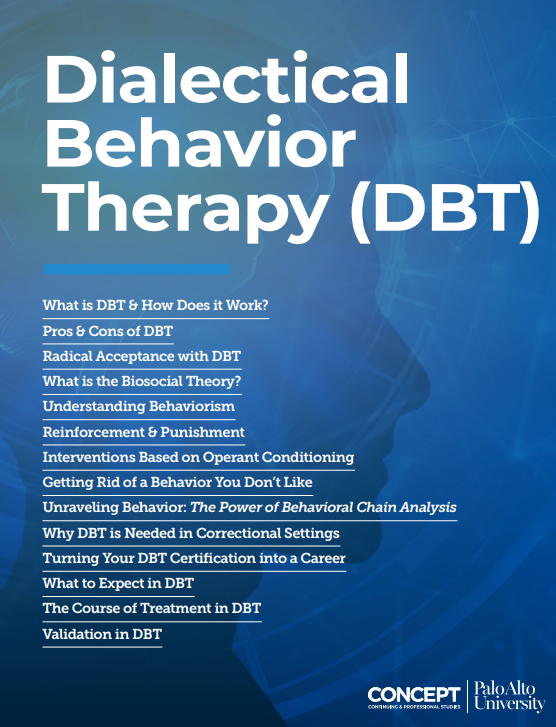Comprehensive Dialectical Behavioral Therapy (DBT)
Elevate Your Practice and Offer Premium Care as a Dialectical Behavior Therapist Certified Through Palo Alto University
DBT has strong empirical support for reducing violence, self-harm, substance abuse, and other destructive behaviors and is used increasingly in justice settings. This form of therapy is a promising intervention for reducing criminality and creating prosocial lives after residential placement or incarceration. Clinicians and leadership practicing in justice-oriented settings are an ideal match for this certification cohort.
What You Can Expect
This certificate requires 3 phases for DBT certification: didactic training, consultation calls and application for Palo Alto DBT Certification. Participants receive:
- A thorough introduction to standard DBT, focusing on its adaptations and strategies in adult and juvenile forensic settings, such as jails, prisons, forensic hospitals, juvenile justice settings, and probation.
- Live, virtual didactic instruction with small group discussion and hands-on application and skill development.
- A DBT team, an essential component for licensed clinicians seeking to complete all requirements for DBT certification.
Presented By

Michele Galietta PhD
Dr. Michele Galietta is an Associate Professor of Psychology at John Jay College of Criminal Justice, the City University of New York, where she served as Director of the Clinical Psychology Ph.D. Program from 2005-2013. Dr. Galietta is a researcher and clinician specializing in the training, adaptation, and dissemination of empirically-supported treatments to community and forensic/correctional settings. Her areas of clinical expertise include the assessment and treatment of trauma, self-harm, and suicide across the lifespan. Dr. Galietta has created specialized units and/or consulted to numerous civil, forensic, and correctional settings on risk assessment, risk management, behavioral interventions, and complex needs case formulation.
Dr. Galietta is regarded as a leading expert in the implementation of dialectical behavior therapy. Dr. Galietta is a certified DBT clinician. For over a decade, Dr. Galietta served as a principal trainer for Behavioral Tech, LLC, the company founded by the developer of DBT, Dr. Marsha Linehan. Dr. Galietta has consulted to over 100 agencies in the US and abroad on DBT initiatives. She has worked extensively in public sector settings, including state psychiatric hospitals and jails, prisons, and juvenile justice settings. She was principal investigator of an NIMH funded trial of DBT for individuals charged with interpersonal violence or stalking and authored the article, “Adapting DBT for the Treatment of Psychopathy.” She has conducted trainings for New York City Police Officers on mindfulness, communicating with mentally ill individuals, and hostage negotiations. Dr. Galietta has appeared on CNN and Court TV, and has been cited in the New York Times, the Washington Post, Time Magazine, and other media outlets.
LIVE: 2025 Cohort | Comprehensive Dialectical Behavioral Therapy (DBT)
Foundational Trainings
DBT Theoretical Roots & Core Elements
Acceptance Strategies in DBT- Zen & Validation
Change Strategies in DBT-Behaviorism & Chain Analysis
Risk Assessment/Management Part 1
Risk Assessment/Management Part 2
Structuring Skills Groups
Core Mindfulness Skills
Distress Tolerance Skills Part 1
Distress Tolerance Skills Part 2
Emotion Regulation Skills
Interpersonal Effectiveness
Middle Path and Specialized Skills for Substance Abuse and Antisocial Thinking
Risk-Responsive DBT Formulation
Pretreatment and the Life Worth Living or Best Life Goal
Commitment Strategies
Creating & Using the Diary Card in DBT Treatment and Structural Strategies in DBT
Sessions
Stylistic & Dialectical Strategies in DBT
Behaviorism in Action: Solution Analysis in DBT
Behaviorism in Action: The Milieu
Coaching Calls, Approach & Coach in the Milieu
Consultation Team
Example Case
Pulling it all Together: Your Case Formulations
Implementation, Adherence, Checklists
You Will Learn To:
1
Describe the core features and structure of Dialectical Behavior Therapy (DBT).
2
Describe the bio-social theory and foundational assumptions of DBT.
3
Describe the research evidence supporting the effectiveness of DBT.
4
Describe DBT adaptations for various settings and populations.
5
Describe therapist-client agreements and the assumptions about clients in DBT.
6
Describe the different modes of DBT and their specific functions.
7
Describe the levels of validation and their application in therapy.
8
Describe a behavioral analysis of problem behaviors.
9
Describe cognitive-behavioral strategies within DBT.
10
Demonstrate the application of behavioral principles for behavior change in a client.
11
Describe problem-solving strategies used in DBT.
12
Describe conducting individual DBT sessions effectively.
13
Demonstrate creating a DBT case conceptualization including goals, stages, and treatment targets.
14
Describe the literature on suicide risk assessment and demonstrate practical assessment.
15
Describe formulating an effective treatment plan to address suicidality.
16
Demonstrate initiating a commitment process with a new client to DBT.
17
Demonstrate the application of various DBT skills groups.
18
Describe the role and function of the DBT consultation team.
19
Demonstrate instructing clients in crisis on using DBT skills effectively.
20
Demonstrate implementing informal exposure techniques with individual clients.
21
Demonstrate communication strategies critical to DBT.
22
Describe case management strategies within the context of DBT.
23
Demonstrate the use and benefits of mindfulness for clients, therapists, and teams.
24
Describe factors crucial to the successful implementation and sustainability of DBT programs.
25
Demonstrate and practice mindfulness within a DBT framework.
26
Learning objective 26
Let Our Team Build the Right Training for Your Organization
Meet 1:1 with Dan, Mel or Patty so they can hear your unique workplace training needs. Tell us about your organization and your staff–and what you need to deliver on your goals and elevate your team. In partnership with our product team and presenters we will customize a program to deliver the skills and knowledge you need–on your budget and timeline.
Book a Call
We Train Organizations of all Sizes




Hear from Program Participants
"Dr. Galietta is a Terrific Instructor"
Dr. Galietta is a terrific instructor who makes the skills and concepts involved in DBT easy to understand and implement. Her depth of experience makes it easy to apply these skills in any setting and with individuals experiencing different types of difficulties. DBT is an important intervention for working effectively with clients and for equipping them with the skills necessary to lead productive, successful lives.”
Manuela Garcia
-LCSW
"I don’t know that I would have passed my boards without CONCEPT."
Having the downloadable source materials to study from was a huge advantage for my board certification tests, since I could review the content as many times as I needed. I don’t know that I would have passed my boards without CONCEPT, since much of what I reviewed in those presentations were covered in my exam.

Learn How to Improve Your Level of Care with DBT
Newly updated in 2025, this comprehensive eBook explores essential and advanced DBT topics, behavior modification techniques and examples of applied principles in clinical scenarios.
Based on a compilation of three of our most popular eBooks, this updated version includes both new and advanced DBT content and expands on key training insights, including complex topics like the biosocial theory and adapting DBT for correctional settings.

